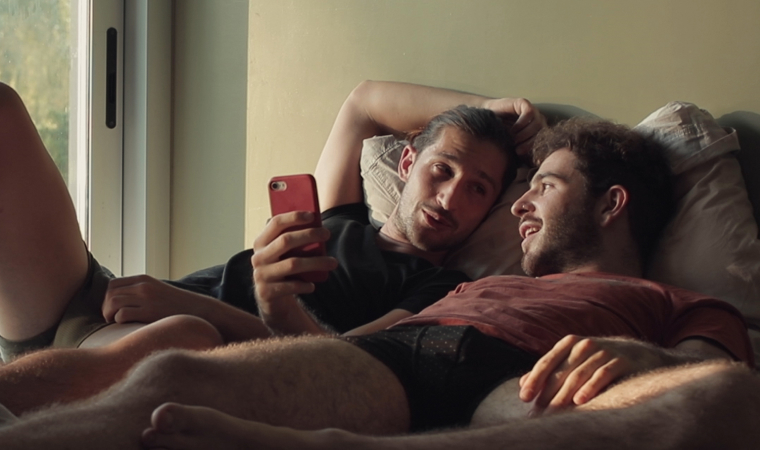
Bruno Giganti as Nico and Agustin Machta as Andy in a scene from "Horseplay." (Photo courtesy of Matchbox Films)
Let's face it: men are horndogs. If not all the time, then definitely during the summer months, when the libidos go up with the temperatures. The uncontrollable lust extends across the Kinsey scale: gay men, bisexual men, men who identify as straight but magically become heteroflexible after a few drinks. Transgender men also like to have sex, it should be pointed out.
Sex is a part of life. Those who have it on a regular basis find themselves craving for more. Those who are not having it, whether out of choice or chronic rejection, find their minds drifting to the act. It's an inconvenient truth for conservative state lawmakers who have put the LGBTQ+ community in their crosshairs to a vicious degree in 2023.
It's also something that National Pride Month celebrations did not delve on this year. The mainstreaming of Pride is an inevitable outcome of the decades-long battle for equality. It is also no justification for the neutering of LGBTQ-themed entertainment. (Remember when people having sex in movies was the norm and not the exception?)
Fortunately, portraits of male intimacy are making an under-the-radar comeback. As Pride Month draws to a close, I take a look at four films where man-on-man sexual contact plays a prominent role: one from Argentina, one from Portugal and a double dose of Australian queerness. There's a searing indictment of toxic masculinity, a politically-fueled musical fantasia, an erotic portrait of a male drifter and a bonafide decades-spanning romance. Let's dig in. You know you want to.
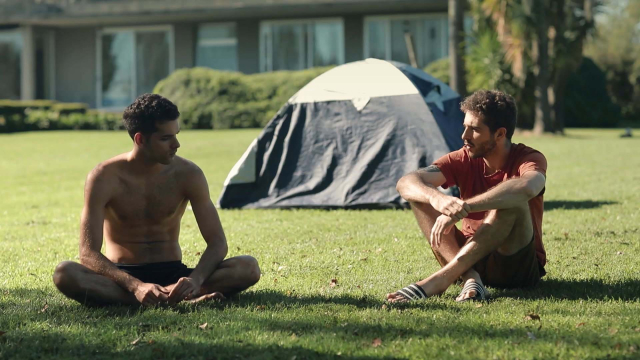
Franco Antonio de la Puente as Poli and Agustin Machta as Andy in a scene from "Horseplay." (Photo courtesy of Matchbox Films)
“Horseplay”: Straight men are jerks. It's a reality that women and the gay guys who count themselves among their friends have to come to terms with sooner or later. That notion is also a specialty in the cinema of Marco Berger. The Argentinian director explores toxic masculinity with laserlike precision and an eye for arresting compositions. He makes what I like to call hangout movies, leisurely paced stories where the narative often takes a back seat to ambiance and texture. A few years back he directed “The Blond One,” a sensual yet sobering portrait of an affair between a Buenos Aires man and his tenant/co-worker. It's one of my favorite gay movies of this century.
But if Berger deserves to be better known north of the equator, he doesn't exactly roll out the welcome mat in his latest portrait of men behaving badly. That's because this is a bitter, angry film, an ensemble piece where the openly gay filmmaker depicts a group of predominantly heterosexual males and examines their homophobia, whether it's rabid and in your face, casual yet not paraded around, or internalized.
“Horseplay” (“Los agitadores”) is entirely set in a luxury villa in the days leading to and just after New Year's Eve, or what many South Americans call summer vacation. Artur (Iván Masliah), whose parents own the villa but are traveling overseas, has brought together a group of his friends. Some of the twentysomething lads are closer than others, and some have known each other since childhood or adolescence. They while away the hours playing video games, bragging about their latest sexual conquests or laying out their plans to score some sexytime behind a girlfriend's back. Did I mention the clothing-optional aesthetic on display? The beefcake quotient is high. How high? There's even a butt contest at one point.
The good-looking men also like to play pranks on each other. Their favorite is to shoot video of an unsuspecting target in a compromising sexual position with another dude. Because it's hi-LAR-ious. Or so they think. Then they post the clips on their group chat. What could possibly go wrong?
The cast is not small, about a dozen or so scantily clad bros, so at first it can be challenging to tell who's who. But let's focus on a duo around whom this sexually charged though only occasionally explicit narrative hinges. Andy (Agustín Machta), well-liked among his peers, is secretly hooking up with Poli (Franco Antonio de La Puente), the reserved wallflower who puts up with his friends' unsavory conduct but is himself a man of few words. One keeps hoping for this timid doormat to grow a spine, but Berger is too much of a realist to settle on such an outcome. In one of the most revealing scenes, Andy reminds his occasional lover about the furtive nature of their encounters. In a few lines of dialogue, Berger summarizes the way men who have sex with men on the down low compartmentalize their actions.
The film's setting and episodic structure are strongly reminiscent of Berger's “Taekwondo” (2016), co-directed with Martin Farina, which is also about a laid-back get-together during which tensions between longtime friends bubble to the surface. But whereas Berger previously aimed to have the viewer surrender to his naturalistic brand of eroticism, he's after something else altogether in “Horseplay.” He wants to deconstruct, not titillate, and he pointedly chooses to end the film with a sudden act of violence – abrupt, ruthless, deeply effective. It's a punch in the gut that brings this potent takedown of machismo to its brutal conclusion. Take the plunge, if you dare.
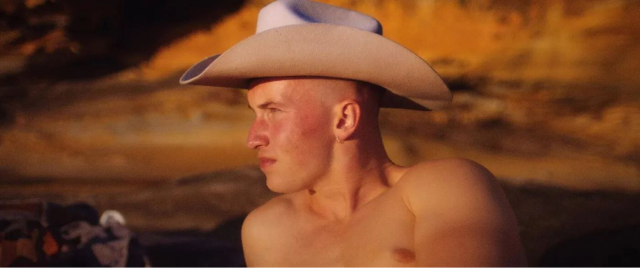
Josh Lavery as Casey in a scene from "Lonesome." (Photo courtesy of Dark Star Pictures)
“Lonesome”: Or maybe you're looking for some old-fashioned erotica that harks back to another era of male desire and leaves little to the imagination. Look no further than this spicy number from Down Under. Writer-director Craig Boreham tells the story of Casey (Josh Lavery), a country bumpkin in a white cowboy hat who comes to Sydney. The farm boy (in his words, “from out west, cattle”) goes from one hookup to the next like a kid in a candy store, and in one scene, crashes a house party to pilfer booze like a pro. But when he meets Tib (Daniel Gabriel), a Grindr rendezvous, for some three-way action, this hunk with a severe crew cut finds himself opening up, confessing he's never seen the sea.
It becomes apparent, beyond Boreham's steamy yet matter-of-fact displays of private parts and bodily fluids, that Casey is not just heading to the big city in search of sexual highs, but running away from something. As he embarks on a casual live-in situation with Tib, who makes it clear he wants to stay unattached, Casey shows there's a scared little boy hiding underneath his confident exterior. Lavery and Gabriel make an attractive interracial pair, and Boreham does not shy away from the challenges Tib faces as a man of color, especially from the police.
“Lonesome” seduces you with frequently sun-kissed widescreen vistas and sensuous copulation. The film is at its best when it sits back and simply shows Casey wandering from one locale to the next. A plot does eventually rear its unwelcome head, turning the movie into a more conventional affair, but Boreham never loses his clear-eyed compassion for the characters, especially when they're confronted with life's seemingly insurmountable obstacles. It's a refreshingly unvarnished view of a gay man living on the margins, rendered with gusto, frank abandon and disarming optimism.
“Will-o'-the-Wisp”: The bad news for some fans of Portuguese director João Pedro Rodrigues is that his latest brainchild is not the kinky odyssey “O Fantasma” was, with its black latex-clad protagonist stalking straight guys. The good news is that his latest feature is an unclassifiable delight, a frothy satire of monarchy and colonialism that has a lot on its plate but never forgets to be fun. Plus it's got musical numbers.
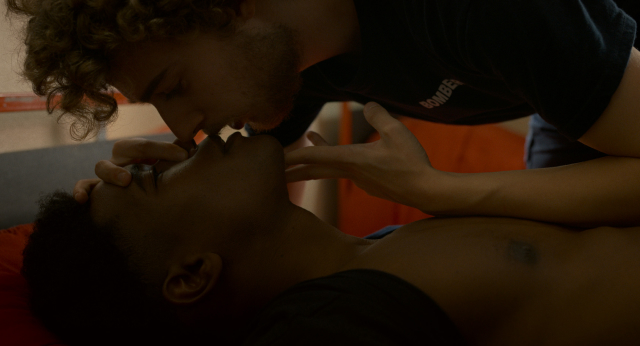
Mauro da Costa as Alfredo and Andre Cabral as Afonso in a scene from "Will-o-the-Wisp." (Photo courtesy of Strand Releasing)
“Will-o-the-Wisp” (“Fogo-Fátuo) takes the shape of a fairy tale, only instead of a princess living in a castle, there's a prince whose eyes are opened to his kingdom's environmental challenges. The threat of forest fires compels Alfredo (Mauro da Costa), His Royal Highness, to volunteer at a fire station. The firefighter assigned to literally show him the ropes is Afonso (André Cabral). Black, athletic and headstrong, Afonso is immediately drawn to the frail and soft-spoken new recruit. Alfredo's training doubles as a most unorthodox courtship, which features an expertly choreographed dance sequence that nevertheless sometimes feels as if characters came up with it on the spot. Sparkle magic.
Sexual heat does develop, leading to a most striking lovemaking sequence out in the open. But while Rodrigues clearly enjoys showing off his actors' bodies, he also sees Alfredo and Afonso as symbols, the flip sides of Portuguese society's coin, their synergy depicted in yin/yang fashion (quite literally at one point).
But for a movie that encompasses so many issues, “Will-o-the-Wisp” could have used a sturdier narrative structure. At 67 minutes, this is one compact cocktail of politics and playtime, albeit one that feels transmitted directly from Rodrigues' subconscious, for good and ill. Despite being bookended by scenes set in the, ahem, year 2069, the content in between occasionally feels disjointed and a tad shapeless. You wish there was more to it.
But what's there is still undeniably enjoyable for viewers seeking a queer flight of fancy off the beaten path, and “Will-o-the-Wisp,” cheeky yet more than a little bleak about where we're headed, is truly one of a kind.
“Of an Age”: Compared to the above titles, this Australian romance feels rather tame, making it ideal Pride Month fare for viewers not quite ready for full-throttle images of men in their birthday suit. Released in theaters back in February, “Of an Age” is the sophomore feature from Goran Stolevski, the gifted Macedonian Australian director behind last year's witch's tale “You Won't Be Alone.”
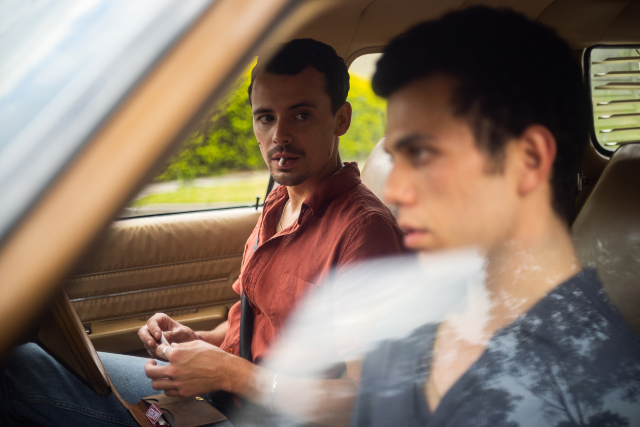
Thom Green as Adam and Elias Anton as Kol in a scene from "Of an Age." (Photo courtesy of Focus Features)
As its title suggests, “Of an Age” is, for most of its running time, a coming-of-age movie. The bulk of the film unfolds over a most eventful day in the summer of 1999, when aspiring dancer Kol (Elias Anton), closeted and driven to succeed, suddenly needs a ride to pick up his BFF Ebony (Hattie Hook) so they can make their audition. Enter Ebony's older brother Adam, played by Thom Green, who looks like Simon Pegg and Anthony Ramos' love child. He reluctantly agrees to make the drive to pick up his sibling. (What compels the drive in the first place will resonate with anyone who has been close to people prone to making poor life decisions.)
But what happens during the drive is something neither Adam nor Kol, who has an extended immigrant family from Serbia waiting for him at home, could have expected. “Of an Age's” best scene unfolds inside Adam's car, as both men get to know each other. A talkfest could have ground this movie to a halt, but under Stolevski's careful stewardship, it has the opposite effect. It doubles as an attempt by Adam, who is open about his sexual orientation but, true to the period, remains guarded about it, to coax Kol out of his shell. The younger man, just 17, is suddenly finding that closet mighty constricting.
Here's the catch: Adam is leaving the country the next day. The ticking clock gives “Of an Age” the urgency it needs. Stolevski may not quite match what Richard Linklater pulled off in “Before Sunrise,” another 24-hour romance, but after crafting a dark, thorny horror film, it's invigorating to see the filmmaker's more tender side.
“Of an Age,” imbued with the allure of a road movie, eventually flashes forward to this century, with both men coming back home for a most special occasion. The reunion is by turns comforting, bittersweet and all too fleeting. One comes away feeling like the film is missing one final scene. At the same time, Stolevski is able to capture the slippery nature of those brief encounters that end up defining who we are and how we seek love. He makes us glad to spend time in the company of these two young people who find their lives changed for the better just by crossing paths. Even if it's just for a little while.
“Horseplay,” “Lonesome” and “Of an Age” are available for digital rental on various platforms, including Prime Video and Vudu. “Horseplay” is now available on DVD. “Of an Age” is also available to stream on Peacock. “Will-o'-the-Wisp,” which had a theatrical engagement earlier this month at the Paradigm Cinemas Gateway in Fort Lauderdale, is not yet available for digital rental, but its DVD release is set for July 11.




